Best PaaS provider of 2025
Run your apps using Platform as a Service

The best Platform as a Service (PaaS) providers make it simple and easy to run your apps using Platform as a Service.
It has become easier than ever to build and develop and host applications, thanks to platform as a service (PaaS) providers. These providers offer the tools that you need to develop, run, and maintain apps on the cloud.
It’s essential not to confuse Infrastructure as a Service (IaaS) for PaaS. They are related but not the same thing. IaaS deals with providing the hardware infrastructure needed to host online services, while PaaS deals with providing the development tools needed to build these services.
You can access PaaS in three major ways. The first and most popular is a dedicated service from a cloud computing provider. You control the software aspects, including the operating system and programming languages, while the cloud provider provides the servers and networking equipment to hold the online services.
The second way to access PaaS is as a private service behind a firewall and the third is as software deployed on public infrastructure. The primary aim of a PaaS provider is to simplify the application development process by taking care of the complex aspects while you handle the easier aspects.
We tested different PaaS providers to identify the best ones. We selected them based on important factors including pricing, performance, features, customer service, etc.
We've also highlighted the best IaaS providers.
The best PaaS providers of 2025 in full:
Why you can trust TechRadar
Best PaaS provider for reliability
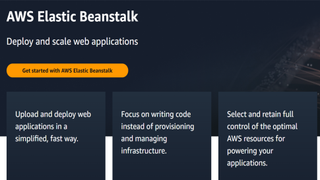
1. AWS Elastic Beanstalk
Reasons to buy
Reasons to avoid
Amazon Web Services (AWS) is the world’s biggest cloud computing provider, with a network of over 200 data centers across the globe. Elastic Beanstalk is a PaaS service built atop AWS.
Elastic Beanstalk provides a platform to let you build and deploy web-based applications easily. The AWS management console is famous for being easy to use and navigate, so you shouldn't face difficulty trying to work your way around this platform. Deploying your apps is easy and as your app becomes more complex, you can upgrade the infrastructure.
Elastic Beanstalk operates on a pay-as-you-go model. The platform itself doesn't incur costs. Instead, you only pay for the AWS infrastructure (e.g., S3 buckets and EC2 cloud instances) that your app consumes. There are no minimum fees or upfront costs needed. AWS has a reputation for being economical on the low end and expensive if your app has high traffic.
Elastic Beanstalk relies on AWS infrastructure, which is very reliable and redundant. AWS guarantees a 99.99% uptime. The main drawback we observed with this platform is that its app debugging and monitoring tools were difficult to use.
Best PaaS provider for security
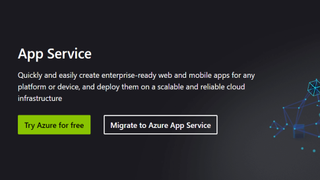
2. Microsoft Azure App Service
Reasons to buy
Reasons to avoid
Azure is a cloud computing service offered by Microsoft, the technology giant best known for its Windows operating system. Microsoft bundles its PaaS and IaaS services together under Azure.
You can use the Azure App Service to create and deploy your apps easily. This platform lets you build web-based apps for personal computers and mobile phones. It supports various programming languages including Python, Java, Node.js, Core, and Microsoft's own .NET.
Azure App Service offers a fully managed platforms that takes care of all infrastructural needs while you focus on programming your app. Azure is famous for its sophisticated security features. It meets rigorous compliance standards, such as SOC and PCI. Microsoft employs thousands of cybersecurity experts dedicated to keeping everything about Azure secure.
Azure has a robust physical infrastructure, with over 200 data centers across the globe, so expect near-perfect uptime for your applications. The main complaints we can point out about Azure is that the interface is difficult to understand, especially for a first-time user. It also has a complicated pricing structure that makes it difficult to estimate your final app hosting costs.
Best PaaS provider for performance
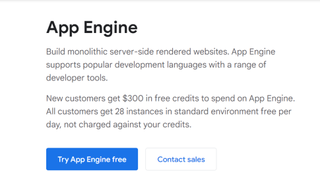
3. Google App Engine
Reasons to buy
Reasons to avoid
Google is best known as a search engine but the company offers many other services including the Google Cloud computing service. Google App Engine is a PaaS built atop Google Cloud. It provides tools for developers to build and host web applications on Google’s powerful data center infrastructure.
Google App Engine supports many popular programming languages including Java, C#, Python, PHP, Go, and Node.js. It offers a fully managed environment, managing all infrastructural needs while you focus on writing code for your app.
App Engine makes it easy to monitor your app's performance; you can use the Cloud Monitoring and Cloud Logging tools to monitor the performance and the Cloud Debugger to identify bugs and fix them quickly. You can easily host different versions of your apps on App Engine and create different development, testing, and production environments for them from a single account.
You can safeguard your app using a firewall and setting custom access rules. Google’s physical server infrastructure is very powerful, so you shouldn’t have problems with scaling your app. However, a major drawback of using App Engine is that it’s more expensive than rival tools.
Best PaaS provider for ease of use
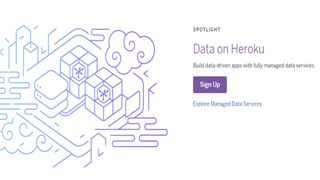
4. Heroku
Reasons to buy
Reasons to avoid
Heroku is a simple platform as a service (PaaS) provider. It makes building and deploying web applications very easy. The platform handles the hard part of maintaining the infrastructure, while you handle the easier parts of programming your app.
Heroku supports various programming languages, including Ruby, Java, PHP, Python, Scala, Clojure, and Go. You can also use several unofficially supported languages via third-party Buildpacks.
The best thing about Heroku is its simplicity. It’s one of the easiest platforms for any developer to understand. For instance, you can create a new server in about 10 seconds by using a simple code on the command line. Check Heroku reviews, and you’ll often see developer experience as the main highlight.
Heroku is relatively affordable if your app doesn’t have much traffic. However, it gets expensive as the traffic grows. Heroku is best used for small projects, as it can be challenging work with if your app gets high traffic.
Best PaaS provider for affordability
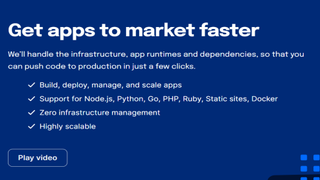
5. DigitalOcean App Platform
Reasons to buy
Reasons to avoid
DigitalOcean is a niche cloud computing provider. Its primary appeal is being a low-cost alternative to the more popular platforms such as AWS, Azure, and Google Cloud.
App Platform is DigitalOcean’s PaaS solution. It offers a fully managed solution to build and deploy your apps. DigitalOcean has an intuitive interface that you'll likely enjoy using.
App Platform secures your apps automatically. It automatically renews your SSL certificates and protects them from distributed denial of service (DDOS) attacks, so you don't have to worry about that.
App Platform supports many programming languages including Python, Node.js, PHP, Ruby, and Go. If your app was built in an unspported language, you can simply provide a Container Image, and DigitalOcean can still run it.
App Platform has a free plan, which lets you build static sites. To build apps, you’ll need a premium plan which starts at just $5 per month. You can choose to use either a shared or dedicated CPU for your app, but the latter costs more.
We've also listed the best cloud orchestration software.
Best PaaS provider FAQs
How to choose a PaaS provider
1. Programming languages
What programming languages do your PaaS provider support? The provider should be "polyglot", meaning it supports multiple languages and lets you choose the one you're familiar with, such as Java, Javascript, C++, Perl, PHB, Ruby, etc.
2. Supported frameworks
A software framework refers to the structure you use to build an online service, e.g., Ruby on Rails for Ruby, Django for Python, and Laravel for PHP. Your PaaS provider should support frameworks that you're familiar with to make it easy for you to develop apps.
3. Scalability
Your PaaS platform should allow you to scale your app with little hassles. As you add users and your data needs grow, it should be able to keep up without reducing the quality of service.
4. Run-time environment
Run-time environment (RTE) refers to the operating system that allows your application to run. Common examples include Apache Tomcat, Jetty, and IIS. Your PaaS provider should support many run-time environments and give you a broad choice for app development.
5. Cost
Cost is a primary consideration when choosing any platform. You should choose a PaaS provider that you can easily afford in the long term. Check the pricing pages and read the fine print to see if there are any hidden costs.
Features of a PaaS provider
1. Web-based development environment
Your PaaS platform should offer a browser-based development environment where you can write code and deploy it in real time. You should be able to see the effects of your code immediately after deploying it.
2. Monitoring and analytics
Your PaaS should allow you to analyze your app’s usage. You should get a breakdown of what resources your app is consuming and how much each one contributes to your final bill. This will make it easy to optimize your app development for lower costs.
3. Database
It should provide database software to store data for your applications. It should also allow you to configure and optimize your database for effective results.
4. Middleware
Middleware refers to software that lies between an operating system and the apps running on it. It includes web servers, content management systems, data integration tools, application programming interfaces (APIs), etc.
Your PaaS platform should provide middleware services to make it easy to develop your apps. Otherwise, your developers will have to spend more time and effort creating these services by themselves.
How we tested the best PaaS provider
We test by evaluating numerous factors. To start with, we look at the feature set, the range of tools available, and what size of businesses this would be ideal for. We consider how easy the setup is, the simplicity of the interface, and whether there's sufficient documentation and tutorials for users to utilize necessary options optimally.
We assess how well the service integrates with other relevant apps, and check the overall scalability of the service. We also analyze whether there are collaboration features for multiple users, and lastly, we judge the quality of the customer service and the different pricing plans available.
Read more on how we test, rate, and review products on TechRadar.
Get in touch
- Want to find out about commercial or marketing opportunities? Click here
- Out of date info, errors, complaints or broken links? Give us a nudge
- Got a suggestion for a product or service provider? Message us directly
- You've reached the end of the page. Jump back up to the top ^
Are you a pro? Subscribe to our newsletter
Sign up to the TechRadar Pro newsletter to get all the top news, opinion, features and guidance your business needs to succeed!
Nate Drake is a tech journalist specializing in cybersecurity and retro tech. He broke out from his cubicle at Apple 6 years ago and now spends his days sipping Earl Grey tea & writing elegant copy.
